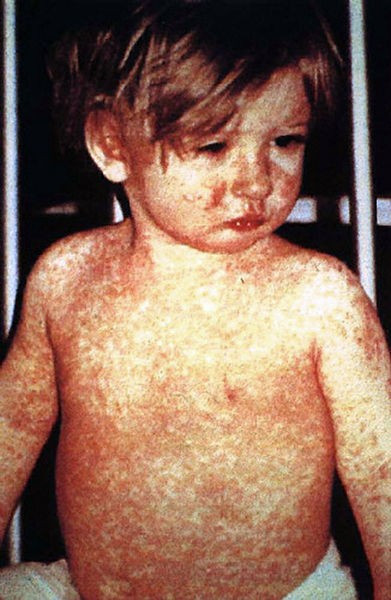Measles Cases Hit 18-Year High: Merseyside, Surrey and Sussex Worst Hit

The number of measles cases in England and Wales reached their highest level in almost two decades last year.
Merseyside, Surrey and Sussex were the areas worst affected by the disease, which has hit an 18-year high.
The Health Protection Agency confirmed that there were 2,016 measles cases last year.
Travelling communities were also affected by several smaller outbreaks, the HPA said.
Dr Mary Ramsay, the Agency's head of immunisation, said: "Coverage of MMR is now at historically high levels but measles is highly infectious and can spread easily among communities that are poorly vaccinated, and can affect anyone who is susceptible, including toddlers in whom vaccination has been delayed.
"Older children who were not vaccinated at the routine age, who may now be teenagers, are at particular risk of becoming exposed, while at school for example.
"Measles is often associated with being a disease of the past and, as a result, people may be unaware that it is a dangerous infection that can lead to death in severe cases.
"Parents should ensure their children are fully protected against measles, mumps and rubella with two doses of the MMR vaccine."
Highly infectious
Measles is highly infectious and symptoms include red eyes, sensitivity to light, a fever, greyish white spots in the mouth and throat and cold-like symptoms.
A red-brown spotty rash appears after a few days. This normally begins behind the ears and then spreads around the head, neck and then the rest of the body.
Before the MMR vaccine was introduced in 1998, measles could lead to serious complications including blindness and death, but this is now very rare in the UK.
Other complications include pneumonia and meningitis.
In August last year, the HPA confirmed the largest measles outbreak on Merseyside since the MMR vaccine was introduced.
It said over 20 percent of cases required hospital admission, with some of those infected becoming seriously ill and requiring intensive care.
Sam Ghebrehewet, Interim Director of the HPA's Cheshire and Merseyside Health Protection Unit, said at the time: "In this outbreak we have seen large numbers of children and teenagers become ill because they were not vaccinated as children.
"These, together with unvaccinated younger children, have put infants too young to be vaccinated and those with underlying illness at serious risk of contracting measles."
© Copyright IBTimes 2025. All rights reserved.






















